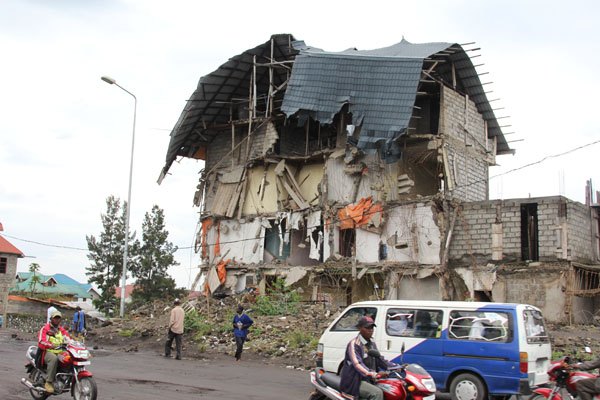
Our car stopped at a government checkpoint on the way to Mumosho, a small town about an hour outside of Bukavu in eastern Congo, and Enough researcher Amani Matabaro jumped out to talk to the armed guards inside a ramshackle hut perched precariously along the cliff at the side of the road. Amani travels this route two to three times per week, and as one of the individuals we were in Congo to profile, we were riding along to meet his friends in the remote village where he grew up and check in on his many projects in the area. Before he could say a word to the guards inside, they laughed and shook their heads, “Come on, man, we know what you’re going to ask us. And you already know the answer,” and with that, Amani handed over his payment.
After years of paying this $5 per car “tax” for road improvements without seeing any progress made, Amani never misses an opportunity to stubbornly ask when the roads will be fixed and goes through this routine exchange every single time he pays the fee and passes by. Without fail, he receives an unsatisfactory answer. But this is Amani’s own private protest—repeatedly demonstrating his frustration about the lack of investment in infrastructure and making his own small statement against the corrupt system that he says sometimes feels as if it only exists to prey on local populations and take money in exchange for broken promises in order to line the pockets of a few government officials.
As the metal gate was lifted and we continued up the steep mountain road that appeared it might wash away with one more heavy rain like we experienced the night before, we started noticing red Xs drawn on many of the homemade shacks lining both sides of the street. These homes and small business, Amani explained, were marked for demolition for a road widening project run by a Chinese-owned and -operated company making gravel in the area. Wider roads were necessary so that larger trucks could pass through the crowded streets. Absent the government’s investment in roads (though with their approval in the hopes they get some credit for the project), the company has taken over. However, it is harming local communities in the process by only investing in areas of strategic benefit to their operations and ignoring the implications of their “improvements,” which will result in the destruction of hundreds of buildings and the displacement of people currently living there.
In Goma, the roads are equally as metaphorical to the many issues associated with government corruption. In late 2010, the European Union proposed paving 64 kilometers of roads inside the city, which currently has none. The plans were so far along, in fact, that former Mayor Rogers Rachidi Tumbula infamously started to destroy people’s homes that he independently deemed too close to the current road for the expansion that would be needed for the project (see picture). When President Kabila began to claim credit for the project as evidence of his successful investment in infrastructure and the need for people to reelect him, the E.U. was forced to cancel their plans in order to remain politically neutral.
With the local government on the hook to produce something (and validate the preemptive destruction of so many homes), they announced that they would complete 44 kilometers of the project themselves. Due to contractual issues and corruption associated with this new deal, the youth of Goma started to protest in early summer and blocked entry into Goma for the governor of the province who was returning from a meeting at the United Nations in New York, forcing him to flee the area for several weeks. In late August, the provincial government announced that a lack of funding would mean cutting the road improvement project down to just 10 kilometers.
As we witnessed this small stretch of road being paved during our recent visit to Goma, the red Xs drawn on each building, we couldn’t help but think about the symbolic nature of the challenges people here face along the long, pot-holed road to peace ahead for Congo. Rebuilding both a physical and social infrastructure in a country that has experienced decades-long conflict on top of a foundation of systematic and deep-seated corruption will take the efforts of Congolese and outside actors alike. But one small protest by an individual, and one paved kilometer at a time, we know progress is possible and that, despite the hurdles, there remains hope for something better.
Fidel Bafilemba contributed to this post.
Photo: Building destroyed in Goma for a road expansion project that is now postponed (Enough/Jeff Trussell)

